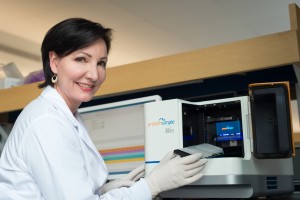
Principal Investigator
B.Sc. [Microbiology] (University of Alberta), Ph.D. [Microbiology] (University of British Columbia)
Professor, Department of Pathology and Laboratory Medicine, University of British Columbia
Research Interests
Aging; lipid metabolism; Neurodegeneration; neuroscience; pathologyDr. Wellington’s major research interests are on both genetic and environmental factors that modulate risk for Alzheimer Disease (AD), the most common dementia. An increasingly recognized environment risk factor for dementia includes a history of traumatic brain injury (TBI). Current projects include understanding how injury severity, number of injuries, and age at injury all affect dementia risk, and understanding how the neuropathology and clinical presentation of TBI-related syndromes overlap with classical dementias. Over two million TBIs occur annually in North America, with rapidly increasing public concern over the long-term effects of concussion on brain health during development and aging. Existing animal models of TBI, however, fail to replicate the mechanics of most real-life human TBIs, which are caused by sharp, angular and/or linear accelerations or decelerations of a freely moving intact head.

Photo courtesy of the Djavad Mowafaghian Centre for Brain Health
Working with biomechanical engineers at ICORD, Dr. Wellington and her colleagues have developed a transformative new model of rodent closed head TBI, called CHIMERA (Closed Head Injury Model of Engineered Rotational Acceleration) that was specifically designed to overcome the caveats that limit the translational relevance of existing TBI models. CHIMERA’s innovation lies in its ability to generate, in a biomechanically controlled and reproducible manner, a wide range of TBI severity with completely free head movement, where head motion analyses are integrated with behavioral and neuropathological outcomes.
Neurotrauma fluid biomarkers: Innovative technologies that enable brain-derived substances to be measured in blood samples are transforming the field of neurology. Blood biomarker tests are becoming essential tools for the diagnosis and management of many brain disorders, from outpatient to critical care settings. With CFI-funded infrastructure, Wellington is conducting many projects in neurotrauma fluid biomarkers including spinal cord injury, traumatic brain injury, concussion, intimate partner violence, and neurocritical care.
Current Lab Members
| Master Students | PhD Students | Postdoctoral Fellows | Undergraduate Students | Research Staff |
|---|---|---|---|---|
|
Kidus Achalu |
Jennifer Cooper | Dr. Bethany Kondiles | Parsa Alizadeh | Dr. Wai Hang (Tom) Cheng |
| Tali Romero | Tetiana Poliakova | Dr. Mehwish Anwer | Chloe Allen | Carlos Barron |
| Dana Go | Mohammad Ghodsi | Mckenna Stuart | Dr. Jianjia Fan | |
| Isabella DiBerardino | Andrew Agbay | |||
| Honor Cheung | Dana Go | |||
| Antoine Cautru | Tessa Morelli | |||
| Tali Romero | ||||
| Dr. Sophie Stukas | ||||
| Anna Wilkinson |
Trainee Awards
| Year | Name | Award |
| 2025 | Dr. Sophia Stukas | UBC Department of Pathology and Laboratory Medicine Mentoring Award |
| Andrew Agbay | UBC Department of Pathology and Laboratory Medicine Staff Service Award (Technicians and technologists category) | |
| Kidus Achalu | UBC Department of Pathology and Laboratory Medicine Trainee Award (MSc student category) | |
| 2024-2027 | Tetiana Poliakova | Vanier Canada Graduate Scholarship, CIHR |
| 2024-2026 | Dr. Mehwish Anwer |
|
| 2024-2025 | Kidus Achalu | Canada Graduate Scholarships – Master’s (CGS M), CIHR |
| Isabella DiBerardino | Canada Graduate Scholarships – Master’s (CGS M), NSERC | |
| Mohammad Ghodsi | UBC Graduate Student Scholarship | |
| 2024 | Mehwish Anwer |
|
| Mckenna Stuart |
VAST Summer Student Scholarship |
|
| Kidus Anchalu |
|
|
| Tetiana Poliakova |
|
|
| Jennifer Cooper |
|
|
| 2023-2024 | Dr. Mehwish Anwer |
Bluma Tischler Fellowship, Faculty of Medicine, University of British Columbia |
| 2023 | Jennifer Cooper |
|
| 2019 | Elyn Rowe |
|
| 2019 | Emily Button |
|
| 2019 | Pantea Azadpour |
|
| 2016 | Iva Kulic |
|
| 2016 | Jerome Robert |
|
| 2016 | Emily Button |
|
| 2016 | Asma Bashir |
|
Recent publications
- Yue, J et al.. 2026. Pharmacological inhibition of O-GlcNAcase reduces pS129-α-synuclein positive aggregates in the substantia nigra of mThy1-hSNCA mice.. J Parkinsons Dis. doi: 10.1177/1877718X251410291.
- Lahiri, D et al.. 2026. CAPS Plus: A clinical biomarker scoring system to predict Aβ positivity and facilitate enrolment in anti-amyloid clinical trials.. Can J Neurol Sci. doi: 10.1017/cjn.2026.10530.
- Bird, JD et al.. 2025. Characterizing the physiology of circulatory arrest in humans.. Nat Med. doi: 10.1038/s41591-025-03889-z.
- Caron, NS et al.. 2025. Molecular and imaging biomarker responses to brain mutant HTT lowering in a mouse model of Huntington disease.. Mol Ther Nucleic Acids. doi: 10.1016/j.omtn.2025.102710.
- Harper, MI et al.. 2025. Advocates, Academics, Survivors and Clinicians to END Intimate Partner Violence (ASCEND-IPV) initiative: a prospective observational case-control study protocol to identify plasma biomarkers of intimate partner violence (IPV)-caused brain injury (BI).. BMJ Open. doi: 10.1136/bmjopen-2024-098025.

